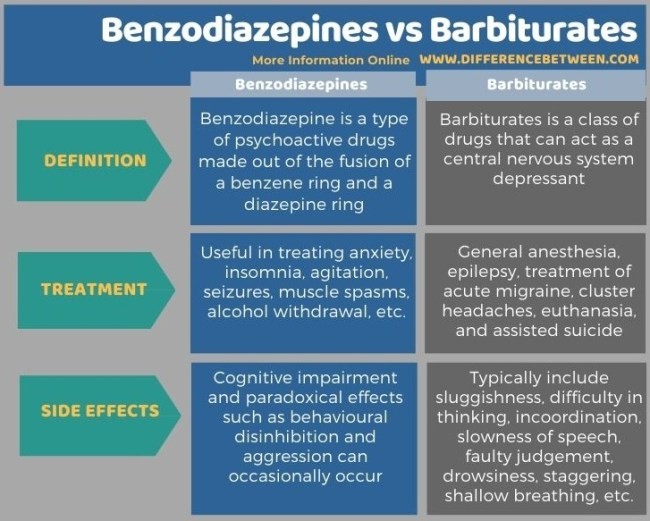
Contents
- 1 Benzodiazepines vs. Barbiturates
Benzodiazepines vs. Barbiturates
Benzodiazepines are central nervous system depressants used to treat anxiety disorders, panic disorders, muscle spasms, seizures, sleeplessness, alcohol withdrawal, premenstrual syndrome, and as sedation during surgery. They enhance the effects of the neurotransmitter gamma-aminobutyric acid (GABA) to reduce excessive nerve activity in the brain.
Barbiturates are central nervous system depressants used to treat headaches, insomnia, and seizures. They reduce nerve activity in the brain by affecting the neurotransmitter GABA.
Side effects of benzodiazepines and barbiturates
Benzodiazepines
Common side effects include lightheadedness, drowsiness, confusion, sedation, memory impairment, improper body balance, appetite changes, nausea, vomiting, constipation, weight gain, dry mouth, reduced libido, and fatigue.
Serious side effects include respiratory depression, dependence and abuse, withdrawal symptoms, jaundice, seizures, suicide, slow heart rate, severe low blood pressure, fainting, akathisia (a movement disorder), and increased heart rate.
Barbiturates
Common side effects of barbiturates include dizziness, lightheadedness, sedation, headache, nausea, vomiting, and abdominal pain.
Interactions with benzodiazepines and barbiturates
Alcohol and similar drugs
Combining alcohol with benzodiazepines is dangerous as it increases the effects of alcohol on the central nervous system. Pain medications called barbiturates can also interact with benzodiazepines, leading to additional depression of the brain and respiratory depression.
Other drug interactions
Barbiturates may accelerate the breakdown of certain medications, reducing their effectiveness. Concomitant use of barbiturates and other central nervous system depressants can lead to excessive sedation, lethargy, and, in severe cases, coma and death.
Can benzodiazepines and barbiturates cause addiction?
Benzodiazepines
Benzodiazepines are habit forming and can cause addiction, especially in individuals with a history of drug or alcohol abuse. Prolonged use may result in tolerance, requiring higher doses to achieve the same effect. These drugs may be effective but should be used cautiously.
Abuse of benzodiazepines can lead to symptoms such as disturbing dreams, irritability, hostility, and amnesia. Signs of addiction include problems sleeping, diarrhea, vomiting, nausea, goosebumps, uncontrollable leg movements, bone and muscle pain.
Recovering from benzodiazepine addiction is challenging due to the drug’s impact on brain chemistry. A drug addiction treatment center should be contacted for assistance in safely tapering off the medication.
Overdose symptoms include clammy skin, dilated pupils, rapid and weak pulse, coma, shallow breathing, and death.
Barbiturates
Barbiturates can slow breathing, reduce heart rate, and are habit forming.
Types of benzodiazepines and barbiturates
Benzodiazepines
Examples of oral benzodiazepines are alprazolam, clobazam, clonazepam, clorazepate, chlordiazepoxide, diazepam, estazolam, lorazepam, oxazepam, temazepam, and triazolam.
Formulations include tablets, extended-release tablets, oral liquid, orally dissolving tablets, capsules, rectal gel, and injections.
Barbiturates
Examples of barbiturates include amobarbital, butabarbital, pentobarbital, secobarbital, belladonna, and phenobarbital, butalbital/acetaminophen/caffeine, and butalbital/aspirin/caffeine.
Formulations include injections, tablets, capsules, and oral liquids.
Safety during pregnancy and breastfeeding
Benzodiazepines
Benzodiazepines are classified as pregnancy category D, indicating potential fetal harm. They should not be used during breastfeeding as they can cause lethargy and weight loss in the newborn.
Barbiturates
Some barbiturates are listed as pregnancy category D, indicating they should not be used during pregnancy. Risk to the infant cannot be ruled out. It is unknown if barbiturates enter breast milk, but they should be avoided during breastfeeding.
Summary
Benzodiazepines and barbiturates are central nervous system depressants used to treat various conditions. Benzodiazepines also treat anxiety disorders, muscle spasms, alcohol withdrawal, and as sedation during surgery, while barbiturates treat headaches. Both drug types can be habit forming or addictive.


